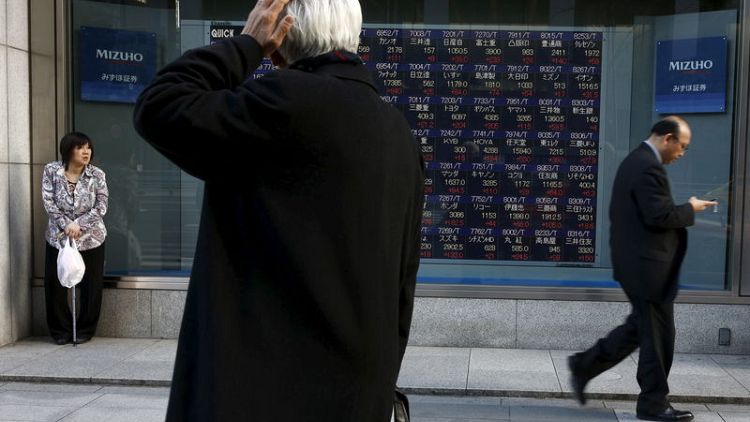By Wayne Cole
SYDNEY (Reuters) - Asian share markets struggled to extend a global rebound on Tuesday after U.S. President Donald Trump seemed to quash hopes of a trade truce with China, dampening risk appetite across the region.
Japan's Nikkei <.N225> managed to eke out a 0.1 percent gain, and Chinese blue-chips <.CSI300> added 0.6 percent.
Other bourses were mixed with MSCI's broadest index of Asia-Pacific shares outside Japan <.MIAPJ0000PUS> easing 0.1 percent. E-Mini futures for the S&P 500 <ESc1> also retreated 0.4 percent, after rising sharply overnight.
In an interview with the Wall Street Journal, Trump said he expects to move ahead with raising tariffs on $200 billion in Chinese imports to 25 percent from 10 percent currently.
Trump said it was "highly unlikely" he would accept China's request to hold off on the increase, planned for Jan. 1.
The comments ran counter to recent speculation about a possible deal when Trump meets Chinese President Xi Jinping at the G20 summit in Buenos Aires later this week.
"Trump's pessimistic view on the chances of a game-changing China trade deal may puncture global equity markets' optimistic start to the week," said Sean Callow, a senior FX analyst at Westpac in Sydney.
"Combined with last week's harsh report from the U.S. trade representative, investors have only the flimsiest hope that the Trump-Xi meeting in Argentina will amount to more than a hill of soybeans."
That put trade-sensitive currencies, including the Australian dollar <AUD=D3>, on the defensive, while the dollar lost some ground on the safe haven yen to 113.46 <JPY=D3>.
The euro edged up a shade to $1.1332 <EUR=> and the dollar dipped to 97.051 <.DXY> against a basket of currencies. [USD/]
OIL SHIFTS RISKS ON INFLATION, FED
Shares in Apple Inc <AAPL.O> fell after-hours in reaction to Trump's comments that tariffs could also be placed on laptops and iPhones imported from China.
Trump's remarks came just as the mood among investors had shown signs of brightening and Wall Street took heart from an upbeat holiday shopping period. [.N]
The Dow <.DJI> had ended Monday up 1.46 percent, while the S&P 500 <.SPX> gained 1.55 percent and the Nasdaq <.IXIC> 2.06 percent.
The rally came after the S&P 500 on Friday recorded its lowest close in six months, down more than 10 percent from September's peaks and back in "correction" territory.
In commodity markets, oil prices faltered anew amid record production by Saudi Arabia. It had climbed nearly 3 percent on Monday but that was seen as largely a technical correction after weeks of heavy losses. [O/R]
U.S. crude <CLc1> was off 41 cents at $51.22 a barrel, while Brent <LCOc1> futures fell 38 cents to $60.10.
Analysts at National Australia Bank noted the 30 percent drop in oil since early October would drag on U.S. inflation in coming months, perhaps offering further reason for the Federal Reserve to go slower on tightening.
"This is a starkly different picture to just a few months ago," said NAB's market strategist Tapas Strickland.
"A stable to lower inflation outlook means there is no urgency for the Fed to hike rates," he added. "An early 2019 pause is thus becoming more probable."
The futures market <0#FF:> has already shifted to imply two more hikes at most next year, while the Fed itself is predicting three and more in 2020.
Ears will thus be pricked for a speech by Fed Vice Chairman Richard Clarida later on Tuesday, ahead of an appearance by Chair Jerome Powell the day after.
(Reporting by Wayne Cole; Editing by Leslie Adler and Richard Borsuk)



